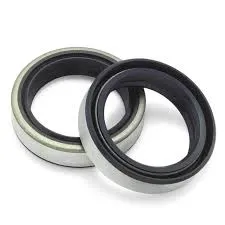10 月 . 07, 2024 00:20 Back to list
high pressure oil seals
Understanding High Pressure Oil Seals A Comprehensive Guide
High pressure oil seals are essential components used in various mechanical systems to prevent the leakage of lubricating oils and other fluids under high-pressure situations. These seals play a crucial role in ensuring the efficient operation of machinery, from automotive engines to industrial equipment. In this article, we will explore the significance, types, applications, and considerations for high pressure oil seals.
Significance of High Pressure Oil Seals
In any machine that uses oil for lubrication, maintaining the integrity of the oil system is of paramount importance. High pressure oil seals prevent the escape of lubricants and protect internal components from contaminants. This sealing efficiency is vital for enhancing the longevity and performance of machinery. Moreover, effective sealing reduces the risk of environmental contamination, ensuring compliance with regulatory standards.
One of the primary tasks of high pressure oil seals is to withstand extreme pressures while maintaining a robust barrier against fluid leakage. This is particularly important in systems where high pressure is generated, such as hydraulic systems, compressors, and various engine components. Without proper sealing, wear and tear can occur rapidly, leading to costly repairs and increased downtime.
Types of High Pressure Oil Seals
High pressure oil seals are available in various designs and materials, each suited for specific applications. The most common types include
1. Rubber Seals Often made from materials like nitrile, fluorocarbon, or silicone, rubber seals are popular due to their flexibility and resistance to various chemicals. They can handle moderate to high pressures and are suitable for a wide range of temperatures.
2. Polymer Seals These seals are made from advanced polymer compounds that offer excellent chemical resistance and thermal stability. They are often used in applications where interaction with aggressive fluids is expected.
3. Metal Seals For extremely high-pressure applications, metal seals provide the best reliability. They often feature an elastomeric O-ring or a composite material for sealing, combining the durability of metal with the flexibility of rubber.
4. Composite Seals By integrating multiple materials, composite seals can provide superior performance in high-pressure environments. They often include layers of rubber for flexibility and metals for strength.
Applications of High Pressure Oil Seals
High pressure oil seals find applications across various industries including
high pressure oil seals

- Automotive In engines and transmissions, high pressure oil seals are crucial for maintaining oil circulation and preventing leaks. They can be found in oil pumps, crankshafts, and differential housings.
- Industrial Machinery Equipment such as hydraulic pumps, compressors, and turbines utilize high pressure oil seals to safeguard their internal mechanisms from oil leakage and external contamination.
- Aerospace In aviation and space exploration, high pressure oil seals must perform reliably under extreme conditions, ensuring the functionality of critical systems like landing gear and hydraulic systems.
- Marine Applications Ships and submarines require high pressure oil seals for their propulsion systems and hydraulic mechanisms, where the reliability of sealing can greatly impact performance and safety.
Selecting the Right High Pressure Oil Seal
When choosing high pressure oil seals, several factors should be considered
1. Pressure Rating Ensure that the seal can withstand the maximum operational pressure of the system.
2. Temperature Range Different materials perform better at varying temperature extremes; select a seal that fits your operational conditions.
3. Chemical Compatibility Assess the type of fluids the seal will encounter and ensure the seal material can resist degradation.
4. Installation Requirements Some seals have specific installation procedures that should be followed to prevent premature failure.
5. Cost vs. Quality While it may be tempting to opt for lower-cost seals, investing in high-quality seals can lead to significant savings in maintenance and repair costs over time.
Conclusion
High pressure oil seals are indispensable in ensuring the longevity and performance of machinery across various applications. Understanding the types, applications, and selection criteria for these seals can help professionals make informed decisions, ultimately enhancing efficiency and reducing operational costs. By prioritizing quality and compatibility in sealing solutions, industries can maintain seamless operations and extend the life of their vital equipment.